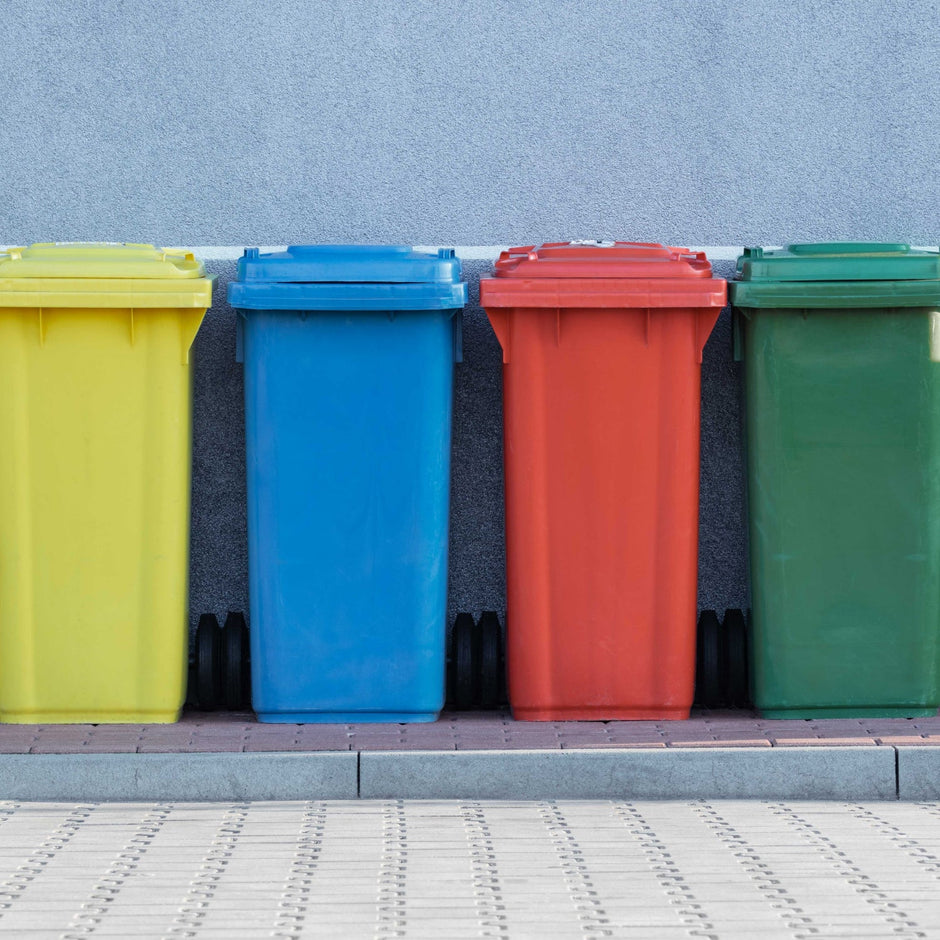Diaper Disposal - Yellow Bag, Organic Waste, or General Trash Bin?
Updated on:
Photo by Pawel Czerwinski on Unsplash
Over the past century, reusable cloth diapers have been replaced by today’s disposable diapers. However, this solution comes with mountains of waste. A child needs about 5,000 diapers before being potty trained. It’s even worse when these diapers are disposed of incorrectly, making recycling difficult or even ending up in nature.
Do used diapers belong in the yellow recycling bag (Gelber Sack)? No. Due to their composition and the human waste they contain, used diapers must be disposed of in general waste. This also applies to bio and eco diapers.
Below, we explain how to properly dispose of used diapers, what you need to keep in mind, and how you can avoid the waste problem altogether.
Proper diaper disposal – here’s how
Even though disposable diapers are mostly made of plastic and cellulose, they do not belong in plastic waste bins. As both components are hardly or not at all biodegradable, composting bins are also not a suitable place for used diaper disposal. German recycling law (Kreislaufwirtschaftsgesetz) also states that human waste may never be placed in organic waste.
In Germany, used diapers must go into residual waste.

Photo by Mahesh Patel on Pixabay
Do bio and eco diapers belong in organic waste?
Even though you might assume that bio and eco diapers can be disposed of in organic waste, this is not the case. Unlike conventional disposables, these contain a higher proportion of biodegradable materials and are made from sustainable resources. However, they are still not fully biodegradable. And even if they were, since diapers contain human waste, they must only be disposed of via general waste.
Also, wipes used during changing belong in general waste. Never flush them down the toilet, as they do not dissolve and may clog pipes. If, however, you use wipes to clean your child’s hands or face, you can dispose of them in the yellow recycling bag.
Diaper bags and diaper bins
During the diapering years, a child uses approximately 5,000 diapers on average. In many households, the residual waste bin overflows again just a few days after being emptied.
Many German cities offer alternatives: municipalities provide special trash bags or even diaper bins designed for collecting used diapers to be picked up separately. This saves space in your household bin, and the diapers are disposed of properly. Check with your city or municipality for more information.
Are compostable diapers the future?
With continuous research, compostable diapers may play a role in the future. The idea is that these can be disposed of on the compost after use, where they will decompose. One clear problem: very few people even have their own compost pile, especially one suitable for disposing of large numbers of diapers.

Photo by @madame.vio
Cloth diapers – the alternative to mountains of waste
At this point, your main choice is between disposable and reusable diapers. A single disposable diaper takes around 500 years to fully decompose. In fact, not entirely: the microplastics from the diaper remain and continue to pollute our planet.
You can avoid this waste problem by choosing cloth diapers instead. Here at Judes, we make switching especially easy: our cloth diapers are used just like disposables—take off the used diaper, put on a new one, done. The key difference is that after use, the diaper doesn’t end up in the trash but goes in the laundry. After being washed, they can be reused. And not just once—our diapers can last an entire diapering period, or even longer.
For example, my son was in cloth diapers until he was potty trained, and when my daughter was born, we used them again. Afterwards, we were even able to sell them and they are still in use today.
Judes cloth diapers consist of a well-designed system and are very easy to use. An inner diaper made of 100% organic cotton catches your child’s waste and is then washed. A waterproof outer diaper ensures the diaper doesn’t leak while allowing air to circulate. You can simply air out the cover after use and reuse it several times before needing to wash it.
At Judes, we are a young start-up dedicated to developing the simplest cloth diaper in the world. Many parents say we’ve done a great job: Judes are just as easy to use as disposable diapers. Some users even find them easier to use!
Conclusion
As you now know, used diapers do not belong in the Yellow Bag. Compost bins are also not suitable. Used diapers belong only in general waste, or in special diaper bags or bins.
Maybe you’re also wondering how you can help prevent our planet from being completely buried in waste? To save our planet and all the living creatures on it—and to give our children a future without mountains of garbage—we need to rethink diapers too. A single disposable diaper takes 500 years to decompose and still leaves behind so-called microplastics. With the 5,000 diapers that a typical child uses before being potty trained, that means an unimaginable amount of waste—which can be avoided! Learn more about the sustainability of cloth diapers on our blog.
Our cloth diapers are just as easy to use as disposables. Instead of ending up in the trash, they go in the washing machine after use and can be reused again and again. This helps protect the environment and provides you with many other benefits.

